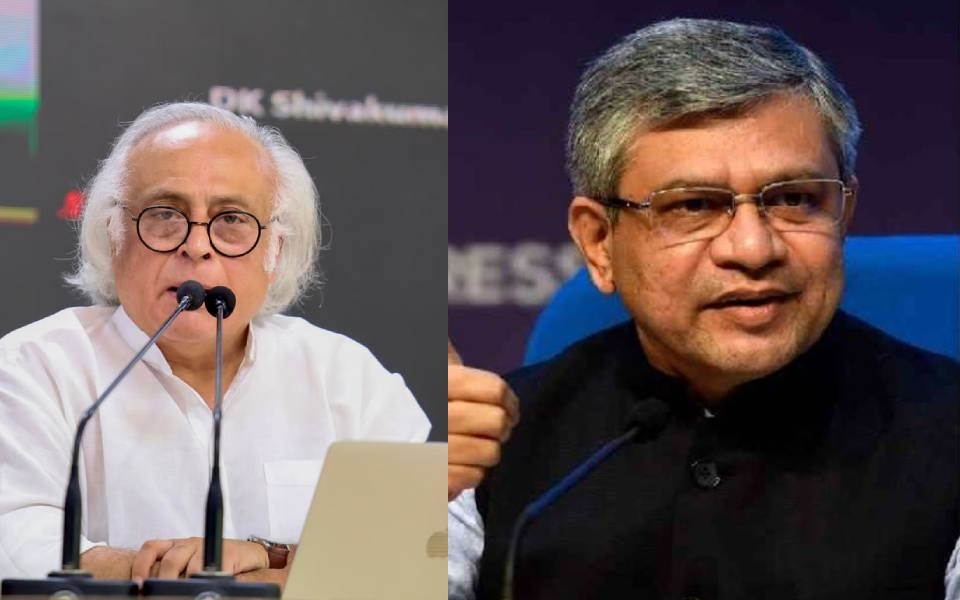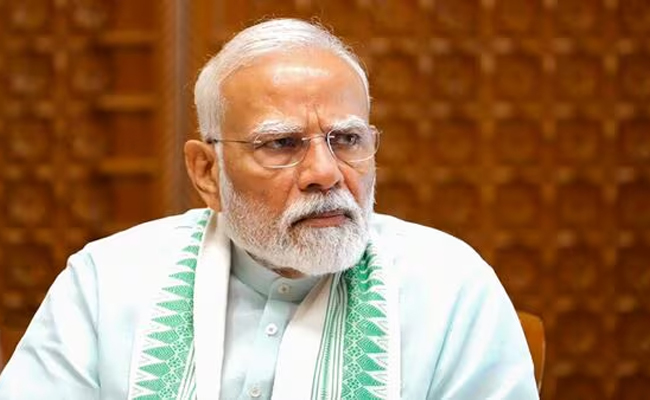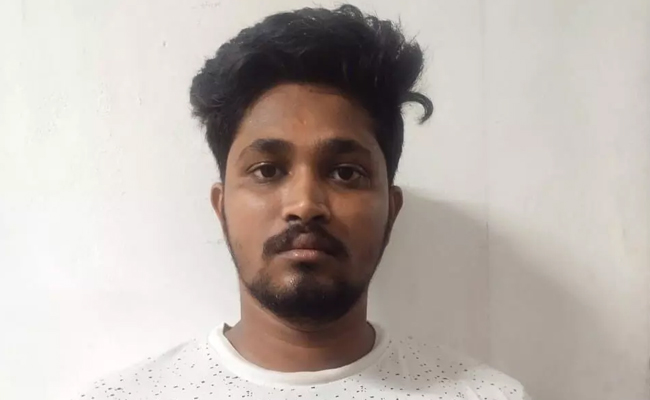New Delhi, Apr 13 (PTI): Senior Congress leader Jairam Ramesh on Sunday said that deletion of the proviso in the RTI Act that recognises citizens' right to information as being at par with that of legislators is "completely unwarranted", and urged IT minister Ashwini Vaishnaw to pause, review, and repeal the amendment made to the original legislation of 2005.
Ramesh's assertion came days after Vaishnaw responded to the Congress leader's earlier letter in which he had expressed concern over Section 44 (3) of the Digital Personal Data Protection (DPDP) Act 2023 which "prohibits" sharing personal information under the Right to Information Act 2005.
Vaishnaw had responded to Ramesh, saying that personal details that are subject to public disclosure under various laws will continue to be disclosed under the RTI Act after the implementation of the new data protection rule.
"Many thanks for your response dated April 10, 2025, to my letter of March 23, 2025, regarding the far-reaching amendment made to the RTI Act, 2005 through Section 44 (3) of the Digital Personal Data Protection (DPDP) Act, 2023.
"I now wish to make four points by way of a counter-response to your defence of the RTI-destroying amendment," Ramesh said in his letter to Vaishnaw on Sunday.
"First, Section 3 of the DPDP Act, 2023, cited in your letter as protecting disclosures under the RTI Act 2005, is wholly irrelevant since Section 8(1) of the RTI Act, 2005 itself has been amended drastically.
"Section 3 of the DPDP Act will now only protect disclosures as per the amended RTI Act, which exempts all personal information from being accessible," the Congress general secretary said.
The operation of the RTI Act, 2005 -- informed by several judgments by the Supreme Court and various High Courts -- has demonstrated that the law is able to withhold the disclosure of personal information that has no relationship to any public activity or public interest, Ramesh said in his communication to Vaishnaw.
The deletion of the proviso in Section 8(1) of the RTI Act which recognises the citizens' right to information as being at par with that of legislators is "completely unwarranted", he contended.
"In fact, that proviso is applicable not just to the personal information exemption, but all exemptions in section 8(1) of the RTI Act, 2005. Fourth, you mention the Puttaswamy judgement of the Supreme Court. Please do remember that nowhere in this judgment is it mentioned that the RTI Act, 2005 itself needs to be amended.
"The judgement reinforces that safeguarding personal privacy and promoting institutional transparency are not mutually exclusive but are jointly essential," Ramesh argued.
"I would therefore strongly again urge you to pause, review, and repeal the amendment made to the RTI Act, 2005. As you would have seen, this issue has also exercised a broad spectrum of people from civil society, academics, and political parties," Ramesh said in his letter to Vaishnaw.
Ramesh in his letter dated March 23 had said that Section 44 (3) of the DPDP Act prohibits sharing personal information under the Right to Information Act 2005.
He had said Section 44 (3) of the Data Protection Act, 2023 seeks to substitute clause j (information which relates to personal information) in sub-section (1) of section 8 of the Right to Information Act, 2005.
He had further said that everything in the sub-section gets deleted due to the change, including the proviso that stated that "provided that the information which cannot be denied to the Parliament or a state legislature shall not be denied to any person".
"The Proviso in Section 8(1)(j) of the RTI Act, 2005 that gives citizens equal right to information as legislators who represent them is totally eliminated," Ramesh had said.
The existing Section 8(1)(j) of the RTI Act, 2005 had enough guardrails to protect unwarranted invasion of privacy, he had argued.
In his response, the minister cited Section 3 of the Digital Personal Data Protection (DPDP) Act 2023 to explain the government's stance.
According to Section 3 of the DPDP Act, the provisions of the Act will not apply on personal data processed by an individual for any personal or domestic purpose and personal data that is made publicly available by the individual himself or any other person who is under an obligation under any law for the time being in force in India to make such personal data publicly available.
Section 44 (3) of the Digital Personal Data Protection Act 2023 seeks to substitute clause 8 (1) (j) in the RTI Act 2005 to deny sharing personal information under the RTI Act 2005.
Opposition INDIA bloc on Thursday had demanded the repeal of certain provisions of the Digital Personal Data Protection (DPDP) Act, contending that these sought to curtail access to public information under the pretext of safeguarding privacy.
Some INDIA bloc leaders, including Gaurav Gogoi (Congress) and M M Abdulla (DMK), had addressed a joint press conference seeking the repeal of Section 44(3) of the DPDP Act that was passed by Parliament in 2023.
They had also said they have signed a joint memorandum for the repeal of this section and it will be submitted to Information and Technology Minister Ashwini Vaishnaw.
.@Jairam_Ramesh asks Modi Govt to "pause, review and repeal" the changes made to the RTI Act through the Digital Personal Data Protect Act, 2023, as he rejects Union Minister Ashwani Vaishnaw's defence of the "RTI-destroying amendment" @DeccanHerald pic.twitter.com/PXtPve45bP
— Shemin (@shemin_joy) April 13, 2025
Let the Truth be known. If you read VB and like VB, please be a VB Supporter and Help us deliver the Truth to one and all.
Mumbai (PTI): The rupee appreciated 24 paise to 89.96 against the US dollar in early trade on Friday, supported by corporate dollar inflows and easing crude oil prices.
Forex traders said the gain in the USD/INR pair follows the rupee’s string of record lows in recent weeks on likely intervention from the Reserve Bank of India.
Moreover, crude oil prices hovering around USD 59 per barrel level supported market sentiment.
ALSO READ:Rupee trades in narrow range against US dollar in early trade
At the interbank foreign exchange market, the rupee opened at 90.19 against the US dollar, then gained some ground and touched 89.96 against the US dollar, registering a gain of 24 paise over its previous close.
In initial trade it also touched 90.22 against the American currency. On Thursday, the rupee appreciated 18 paise against the US dollar to close at 90.20 against the greenback.
The rupee sank to a fresh record low, breaching the 91-a-dollar mark for the first time on Tuesday.
"Since the speculators are out of the market the buying of US dollar syndrome has come down a bit though intra-day we could see spikes," said Anil Kumar Bhansali Head of Treasury and Executive Director Finrex Treasury Advisors LLP.
The US CPI came lower than expected but was also due to non-collection of sufficient data and therefore, the next month’s CPI becomes more important, Bhansali said, adding that "Rupee remains in a range of 90-90.50".
Meanwhile, the dollar index, which gauges the greenback's strength against a basket of six currencies, was trading 0.04 per cent higher at 98.46.
Brent crude, the global oil benchmark, was trading lower by 0.27 per cent at USD 59.66 per barrel in futures trade.
On the domestic equity market front, the 30-share benchmark index Sensex climbed 375.98 points to 84,857.79, while the Nifty was up 110.60 points to 25,934.15.
Foreign Institutional Investors purchased equities worth Rs 595.78 crore on Thursday, according to exchange data.
Meanwhile, Economic Advisory Council to the Prime Minister (EAC-PM) member Sanjeev Sanyal on Thursday said he is not concerned about the rupee at all, arguing that even China and Japan witnessed exchange rate weaknesses during their high growth phases.
Speaking at 'Times Network's India Economic Conclave 2025', Sanyal said since the 90s, the rupee has mostly been allowed to find its own level, but the RBI uses its reserves to intervene in either direction to stop excessive volatility.
"I am not concerned about the rupee at all... Let me say that the rupee and its current weakness should not be necessarily conflated with some economic worry, because historically, if you go over time, you will see that economies that are in their high growth phase very often go through a phase of exchange rate weakness," he said.





